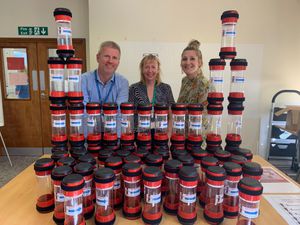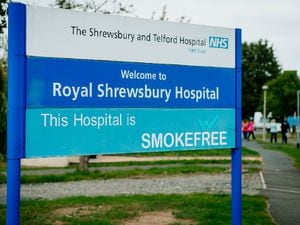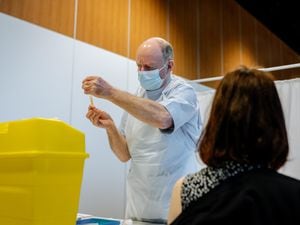Shropshire hospitals in move to reduce time taken to send blood samples to labs
The trust that runs Shropshire’s two acute hospitals has taken delivery of 60 new blood culture pods to dramatically reduce the time it takes for samples to be transported to its labs.

The new plastic pods are safer than the glass pods they replace, and initial calculations suggest as much as one hour could be saved in the time it takes for a sample to reach the pathology labs using air tube systems at the Shrewsbury and Telford Hospital Trust (SaTH) which runs the Royal Shrewsbury Hospital (RSH) and The Princess Royal Hospital (PRH) in Telford.
The new pods will be launched at the RSH before being rolled out at PRH.
The move was to mark World Sepsis Day which took place on Friday (Sept 13).
Karen Gibson, senior specialist biomedical scientist at SaTH, said: “Our target is to load all samples within one hour. The arrival of the pods – which have been kindly funded by SaTH Charity – will allow us to hit our target, but most importantly they will be responsible for saving lives.”
Angela Windsor, sepsis nurse practitioner at SaTH, said: “Mortality increases by 10 per cent for every hour’s delay in administering antibiotics in cases of sepsis, and it is also important to ensure the patient is given the correct antibiotics.
“We have made tremendous strides in improving our performance and the delivery of these pods should allow us to meet our ambitious target and save more lives.”
As SaTH's first sepsis nurse practitioner, Angela is keen to raise awareness of sepsis, and the improvements the trust is making in treating it. "My job is to ensure that staff can identify the risk of sepsis in patients with signs of infection and ensure that, once this risk been identified, patients with ‘red flag’ symptoms receive their bundle of care within a 60 minute time frame," she said. "Every ward and most clinical areas have a sepsis trolley or sepsis box, which has all the necessary equipment to help staff intervene in suspected sepsis cases.
"Sepsis is not a type of infection, but rather the body’s response to an infection that has gone into overdrive. Many sick patients will have symptoms similar to sepsis without having the condition itself, so we must use tools to help us identify and treat those most at risk until we can either confirm or rule out sepsis.
"SaTH has developed its own tools to assist with this process, and I spend time working closely with teams to look at patient care and highlighting areas of excellence to show how recognition and treatment can and should be done.
SaTH has also launched ‘Sepsis Stars’ – a monthly award for staff who demonstrate excellence relating to sepsis.
The condition kills more than 42,000 people each year in the UK, more than breast, lung and bowel cancer combined.





